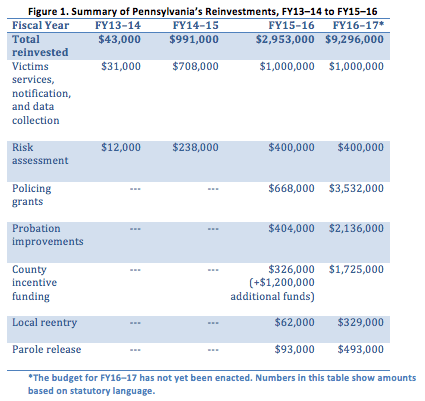 Four years after enacting Justice Reinvestment legislation (Act 196 and Act 122), Pennsylvania can point to significant improvements in its criminal justice system. The state has reduced inefficiencies in its parole and corrections systems; developed responses to major parole violations that include short periods of incarceration followed by supervision and treatment, as necessary; and made changes to state-funded community corrections programs. As a result of these and other policies, the state has averted millions of dollars in corrections costs and seen its prison population decrease by more than 1,800 people between June 2012 and December 2015. These outcomes have enabled the state to reinvest a portion of those savings—more than $13.5 million—in public safety strategies since 2012.
Four years after enacting Justice Reinvestment legislation (Act 196 and Act 122), Pennsylvania can point to significant improvements in its criminal justice system. The state has reduced inefficiencies in its parole and corrections systems; developed responses to major parole violations that include short periods of incarceration followed by supervision and treatment, as necessary; and made changes to state-funded community corrections programs. As a result of these and other policies, the state has averted millions of dollars in corrections costs and seen its prison population decrease by more than 1,800 people between June 2012 and December 2015. These outcomes have enabled the state to reinvest a portion of those savings—more than $13.5 million—in public safety strategies since 2012.
This reinvestment funding became available thanks to a new policy guiding parole agents’ responses to technical violations of parole. In 2014, the Pennsylvania Department of Corrections (DOC) and the Pennsylvania Board of Probation and Parole (PBPP) found that as this policy was initially being implemented, parole agents were frequently using their discretion in responding to technical violations by recommending revocations to prison, rather than using intermediate sanctions such as technical parole violator centers. In response, the PBPP adopted a revised policy in February 2015 requiring parole agents to increase their use of technical violator centers before recommending revocations and reincarceration. As a result, the number of people being held in prisons for technical violations of parole fell by approximately 70 percent between January 2013 and December 2015. In FY2012–13, Pennsylvania saved $56,000 due to the justice reinvestment policies, and by FY15–16, the state had saved $38.4 million.
A statutory formula in Act 196 calls for 75 percent of the savings generated by the Justice Reinvestment policies in FY2013–14, 100 percent of the FY14–15 savings, and 25 percent of the FY15–16 and FY17–18 savings to be distributed to DOC, PBPP, and the Pennsylvania Commission on Crime and Delinquency (PCCD) to fund programs and activities that improve the delivery of criminal justice services within the state. The act requires that the first $1.4 million spent each year through FY2017–18 be used for the development of a presentencing risk assessment tool expansion of programs for victims of juvenile offenders, communication through the statewide automated victim information and notification system, and victim services automated data collection and reporting projects. After the $1.4 million investment threshold is met, reinvestments must be allocated for other initiatives, including grants for local law enforcement, incentives for county jails, and improvements to county probation. FY15–16 was the first year the reinvestment exceeded this threshold, allowing for funding to be applied to these other initiatives.
 Based on the statutory formula, Pennsylvania is expected to increase its reinvestment amount from $42,000 in FY2013–14 to $9.6 million in FY2016–17. [See Figure 1] According to the statutory formula, this increase will enable the state to spend $3.5 million in FY16–17 on innovative policing grants for local law enforcement departments. Additionally, the state must invest $2.1 million in county probation improvements and $1.7 million in incentive funding for county jails.
Based on the statutory formula, Pennsylvania is expected to increase its reinvestment amount from $42,000 in FY2013–14 to $9.6 million in FY2016–17. [See Figure 1] According to the statutory formula, this increase will enable the state to spend $3.5 million in FY16–17 on innovative policing grants for local law enforcement departments. Additionally, the state must invest $2.1 million in county probation improvements and $1.7 million in incentive funding for county jails.
Despite its declining prison population and averted corrections costs, Pennsylvania has the highest rate of incarcerated adults in the Northeast and spends more than $2 billion annually on corrections. Pennsylvania now seeks to make further improvements to its criminal justice system that will help generate greater savings for reinvestment in public safety strategies. To that end, Pennsylvania launched its current Justice Reinvestment effort in March 2016. Pennsylvania’s Justice Reinvestment Working Group, which includes DOC and PBPP and is chaired by Josh Shapiro, chair of PCCD, will continue to work with other state leaders to develop policy options for the General Assembly’s consideration in 2017. “Governor Wolf is committed to building on the successes of justice reinvestment and looking beyond the prison system to produce the results taxpayers expect,” Pennsylvania DOC Secretary John E. Wetzel said. “That’s why we are engaged in the Justice Reinvestment process again. With our latest effort we have the opportunity to tackle challenges at the front end of the system, including sentencing and pretrial policies.”
Arkansas policymakers have long expressed concerns about the state’s high recidivism rate. Over the past 10 years, an…
Read MoreIn April 2025, Arkansas Governor Sarah Huckabee Sanders signed a package of bipartisan criminal justice legislation into law,…
Read More Explainer: Key Findings and Options from Arkansas’s Justice Reinvestment Initiative
Explainer: Key Findings and Options from Arkansas’s Justice Reinvestment Initiative
Arkansas policymakers have long expressed concerns about the state’s high recidivism rate.…
Read More Explainer: How a New Law in Arkansas Tackles Crime, Recidivism, and Community Supervision Challenges
Explainer: How a New Law in Arkansas Tackles Crime, Recidivism, and Community Supervision Challenges
In April 2025, Arkansas Governor Sarah Huckabee Sanders signed a package of…
Read More









